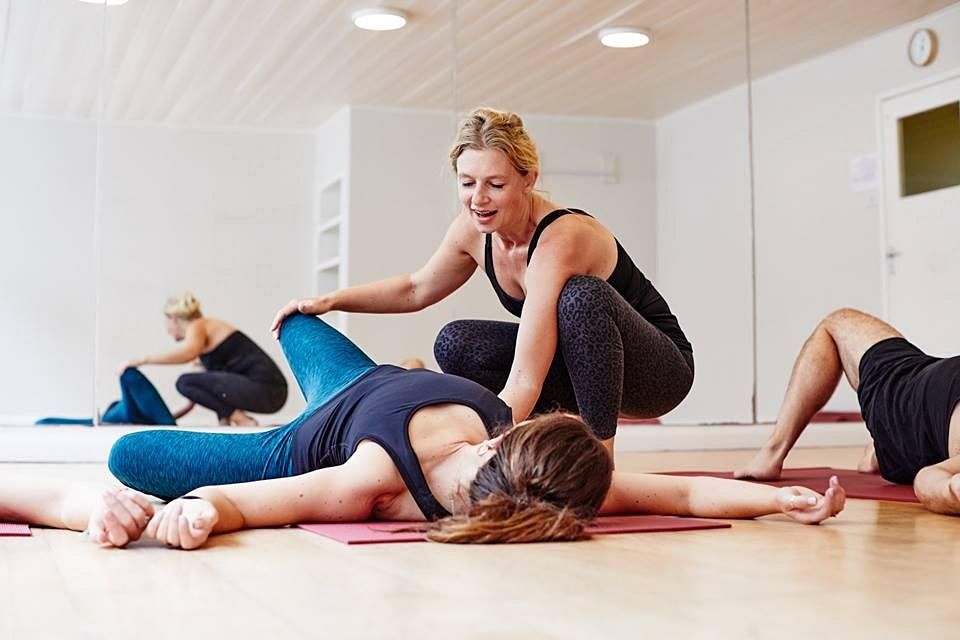
Advertisement
Note - £180 is DEPOSIT ONLY for 6 month course - see below for full priceCourse for yoga teachers, teacher trainees (and wellness professionals with yoga experience) with Charlotte Watts SYT
London - 6 x day sessions
Includes free access to Charlotte’s online course Yoga for Digestive Health (worth £200) as supports course content
Course description
This course has been designed as an explorative journey for yoga teachers, yoga therapists and others to delve into how a compassionate and subtly attentive relationship with their bodies, practice and teaching can help address these commonly seen dis-ease states. This may be as a route to unravelling their own states and/or supporting those in students. There will be inclusion of Somatics practices – from the work of Thomas Hanna that emphasises internal physical perception and experience – and sits well within yoga to support modern body needs.
Each intake will take ten students maximum (12 in London day course) to ensure a small, safe and intimate group dynamic. Other movement teachers and wellness practitioners are welcome to apply if they have at least a year’s yoga practice.
A large part of this exploration will be modern stress and trauma, and what this means for our bodies, minds, yoga teaching and practice; on and off the mat. Charlotte Watts gathers together strands of her courses on Teaching Yoga for Stress and Burnout, and for ME/Chronic Fatigue (for Yogacampus) and her recent books Yoga Therapy for Digestive Health (Singing Dragon 2018) and The De-Stress Effect (Hay House 2015), for an experiential dive into how we can view symptoms of 21st century living through the lens of the Yoga Model of Wellness.
Course dates:
London: 6 Saturdays (roughly monthly) 11am-6pm autumn/winter 2020/21: Sep 19th, Oct 24th, Nov 14th, Dec 12th, Jan 16th, Feb 13th
Who is the course aimed at?
Qualified yoga teachers who have either recognised their own need for self-care, self-support, stress coping, trauma recovery and health practices; and/or who want to guide others they teach – either in specifically tailored class, workshops etc or to recognise the more subtle needs of those within more general classes. Also those looking for an introduction to Somatics and included this practice within yoga teaching.
Others will be considered on a case-by-case basis according to relevant experience, including trainee yoga teachers, yoga therapists and other health professionals.
How is the course assessed?
At the end of the course, an assessment will be set. This will be a written exploration of a personal chosen and related topic, designed teaching practice and reflections when both taught to a group or individual student and as a self-practice. Completion of course is granted on submitting the assessment within a month of the last date of the taught course. If the assessment is not up to pass standard, then constructive feedback will be given and one more submission (within one week) will be allowed. Those who do not pass will then have the option to redo the course at 20% discount.
Breakdown of the 70 hours course CPD hours:
12 sessions at 3 hours or 6 days at 6 hours = 36
12 x 2.5 hour/ 6 x 5 hour suggested reading/watching/self-enquiry/practice = 30
Written assessment = 4
Course content
Each of the 12 sessions will be set out in a format such as this :
30 mins – checking in with the enquiry/self-practice from the week before (intros week 1)
1 hour – talk from Charlotte on the theme of the evening
1 hour – taught yoga practice to experience the theme
30 mins – reflections on the practice; discussion of related home exploration
The 6 day course will follow such a format morning and again in the afternoon to cover the same themes as the 12 week course.
Course Details
Maximum of 10 or 12 people per intake – 10 in Brighton, 12 in London
Toilet breaks and refreshments during discussion times to maximise the time
Weekly handouts given at the course – beginning of sessions – building up to a comprehensive folder of notes
Weekly home reading/watching/self-enquiry/practice sheet given out weekly – end of sessions
Audio of the practice taught sent after for guided Home Exploration
Pre-reading of Charlotte’s book Yoga Therapy for Digestive Health a prerequisite – passages from the book may be recommended for weekly reading or preparation
Includes free access to Charlotte’s online course Yoga for Digestive Health (worth £200) as supports course content; includes 18 hours of lectures, practices and teachers’ commentary for practices, which you will be directed to use for study outside the group hours where appropriate.
COURSE CONTENT – 12 themes
1. Arriving – Setting our community healing space. Where we find ourselves in modern life and what it means to be a ‘modern yogi’ in a world of goal orientation, high expectation and physical ideals. How these considerations can be supported by the yoga model of healing and recovery, as distinct from the reductionist model of disease.
2: Context of the Modern World – The stress response and what it means for the modern yogi – the effects of modern life and psychosocial stress on the nervous system, noticing polarities, somatic practices, survival over growth. Bringing in the yamas and the gunas as guides for practice and life.
3: Vagal Connection – Trauma & polyvagal theory – the freeze response, grounding, orientation and what this means within practice on and off the mat. The importance of the vagus nerve and old/new vagal tones.
4: Belly Connection – The enteric nervous system aka ‘second brain’ and listening to ‘what is true right now’, as well as sense of safety, intuitively responding and embodied awareness. Observing separation of head and body in reductionist culture; coming back to ‘head, heart and hara’ as whole.
5: The Fascial Web – Fascia as a sensory organ and how everything is connected to everything else. Communication via the psoas and fascia for kinaesthesia; interoception and proprioception, and how tightness, lesions and distortions in this matrix can ripple through the nervous system and affect how we move and feel.
6: Posture & Self – Modern postural habits from stress, sitting on chairs and trauma patterns. Including exploration of the primary and secondary spinal curves, the ventral and dorsal aspects (front and back body) and expressions of these via breath tones, and the Deep Front Line (Anatomy Trains) and sense of self.
7: Body Psychotherapy – Modern chakra theory & developmental trauma models for body psychotherapy – relationships with survival, trust, attunement, attachment and autonomy and how they affect our expressions through responses, gestures and movement.
8: Mindful Language – Stress, trauma & hypervigilance language – the modern habits of goal-oriented and self-critical language; how this affects yoga practice and teaching. The language of modern mindfulness as a helpful guide; inviting movement rather than imposing our will and the support of sound during physical practice.
9: Health as Whole – The yoga model of wellness (as opposed to the medical model of disease) and approaching health as coming back to whole, the root of the word ‘healing’. Discussing the koshas and layers of makes up our whole being. Identification with illness as a state and finding our essence nature.
10: Inner & Outer Dialogue – Teaching language and inner voices – self-regulation and co-regulation with students via mindful attention, self-compassion and clear boundaries. Recognising we all have inner dialogue and how this may be bought into relationship with students.
11: Self-Empathy for Givers – Self-protection for yoga teachers – support, self-care, the courage to slow down – recognising what we need and the empathy to trust our students may need that too.
12: Bringing it all together – Bringing it all together – this week is a clear space to go through any elements that need more attention and come together as a group for overall reflection.
Course fees:
£540 or £480 total to be paid in one of these ways:
£540 when paid in installments – £180 deposit to secure a place on the course, then two extra payments of £180 for total to be paid before last quarter of the course time; you will be sent a schedule on booking
Reduced price of £480 if paid in full before the first course date
- 15% concession for those on low income or benefits (10% off full price reduced payment) – please contact Charlotte to discuss
- Includes free access to Charlotte’s online course Yoga for Digestive Health (worth £200) as supports course content – you will be given a code to access.
For further details visit: https://www.charlottewattshealth.com/yoga/yoga-for-healing-and-recovery-moving-beyond-stress-trauma-burnout-anxiety-fatigue-and-post-illness-through-embodied-awareness/
Advertisement
Event Venue & Nearby Stays
Evolve Wellness Centre, 10 Kendrick Mews, London, United Kingdom
Tickets
GBP 166.43
